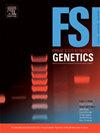Internal validation of the Precision ID GlobalFiler NGS STR panel v2 kit with locus-specific analytical threshold, and with special regard to mixtures and low template DNA detection
IF 3.2
2区 医学
Q2 GENETICS & HEREDITY
引用次数: 0
Abstract
We performed an internal laboratory validation of the Precision ID GlobalFiler NGS STR panel v2 kit to assist the introduction of the technology into the routine forensic casework practice. The study was designed and evaluated based not only on the key validation standards like sensitivity, stability, reproducibility, repeatability, mixture, and concordance, but we also tested the effect of reduced input DNA, we measured and applied locus-specific analytical threshold values, tested two different PCR cycle conditions, sequence artifacts and stutters were also analysed. During the study we also tested the new method on real casework samples. The sensitivity study confirmed that adding 500 pg template DNA for library preparation can be optimal at base PCR cycle number (that was 24), because the measured average heterozygote balance was not lower than 0.82, and each allele was detected above the analytical threshold. However, contrary to previous communications, increasing the PCR cycle numbers up to 28 has not resulted the significant elevation of the heterozygote imbalance. According to our results, raised PCR cycle condition (i.e. 28) is appropriate at or below 150 pg total input DNA. For most loci, the calculated AT was lower than the manufacturer’s recommended. Applying the newly established ATs with raised PCR cycle conditions the allele detection sensitivity and reliability increased. We observed allele dropouts only at the 15 pg template DNA experiments with 5 % frequency, that is better to previously published studies. This result indicates that this low amount of DNA (i.e. 15 pg) could be a minimum limit of template input for a potentially successful analysis. In the mixture study the minor contributor could be detected up to 1:19 mixture ratio. We detected minor alleles in all measurements and concentrations above the threshold if the template DNA were fixed and only SNP differences were observed between the same alleles of the contributors. To test concordance between the new method and traditional STR genotyping we analysed 58 Hungarian individual samples in parallel. Nearby the detected 248 different length-based alleles on the 31 loci in the sample pool we revealed additional 75 sequence variant alleles, that represent an approximately 23 % increase in the total number of observed alleles. The casework study confirmed that the Precision ID GlobalFiler NGS STR panel v2 kit is effective even in genotyping degraded samples with extremely low levels of DNA, if we apply elevated cycle number for library preparation and use locus-specific analytical thresholds.
Precision ID GlobalFiler NGS STR panel v2 试剂盒的内部验证,采用特定基因座的分析阈值,并特别注意混合物和低模板 DNA 的检测
我们对 Precision ID GlobalFiler NGS STR 面板 v2 试剂盒进行了内部实验室验证,以协助将该技术引入常规法医办案实践。这项研究的设计和评估不仅基于灵敏度、稳定性、再现性、可重复性、混合物和一致性等关键验证标准,我们还测试了输入 DNA 减少的影响,测量并应用了特定基因座的分析阈值,测试了两种不同的 PCR 循环条件,还分析了序列伪影和停顿。在研究过程中,我们还在实际案例样本中测试了新方法。灵敏度研究证实,在基本 PCR 周期数(即 24)下,加入 500 pg 模板 DNA 进行文库制备是最佳的,因为测得的平均杂合子平衡不低于 0.82,而且每个等位基因的检测结果都高于分析阈值。然而,与之前的交流相反,将 PCR 周期数增加到 28 并没有导致杂合子不平衡的显著提高。根据我们的研究结果,提高 PCR 周期条件(即 28 个)适合于输入 DNA 总量在 150 pg 或以下的情况。对于大多数位点,计算出的 AT 值都低于制造商的建议值。在提高 PCR 周期条件下应用新确定的 AT,等位基因检测的灵敏度和可靠性都有所提高。我们仅在 15 pg 模板 DNA 实验中观察到等位基因脱落,脱落频率为 5%,这比之前发表的研究结果要好。这一结果表明,这种低量的 DNA(即 15 pg)可能是成功分析所需的最低模板输入量。在混合物研究中,小分子贡献者的检测比例可达 1:19。如果模板 DNA 是固定的,并且只观察到贡献者相同等位基因之间的 SNP 差异,那么我们在所有测量值和高于阈值的浓度中都能检测到小等位基因。为了检验新方法与传统 STR 基因分型的一致性,我们对 58 个匈牙利个体样本进行了平行分析。在样本库中 31 个位点上检测到的 248 个不同长度的等位基因附近,我们又发现了 75 个序列变异等位基因,这意味着观察到的等位基因总数增加了约 23%。案例研究证实,如果我们在文库制备过程中采用较高的循环次数并使用特定位点的分析阈值,Precision ID GlobalFiler NGS STR panel v2 试剂盒即使在对 DNA 含量极低的降解样本进行基因分型时也是有效的。
本文章由计算机程序翻译,如有差异,请以英文原文为准。
求助全文
约1分钟内获得全文
求助全文
来源期刊
CiteScore
7.50
自引率
32.30%
发文量
132
审稿时长
11.3 weeks
期刊介绍:
Forensic Science International: Genetics is the premier journal in the field of Forensic Genetics. This branch of Forensic Science can be defined as the application of genetics to human and non-human material (in the sense of a science with the purpose of studying inherited characteristics for the analysis of inter- and intra-specific variations in populations) for the resolution of legal conflicts.
The scope of the journal includes:
Forensic applications of human polymorphism.
Testing of paternity and other family relationships, immigration cases, typing of biological stains and tissues from criminal casework, identification of human remains by DNA testing methodologies.
Description of human polymorphisms of forensic interest, with special interest in DNA polymorphisms.
Autosomal DNA polymorphisms, mini- and microsatellites (or short tandem repeats, STRs), single nucleotide polymorphisms (SNPs), X and Y chromosome polymorphisms, mtDNA polymorphisms, and any other type of DNA variation with potential forensic applications.
Non-human DNA polymorphisms for crime scene investigation.
Population genetics of human polymorphisms of forensic interest.
Population data, especially from DNA polymorphisms of interest for the solution of forensic problems.
DNA typing methodologies and strategies.
Biostatistical methods in forensic genetics.
Evaluation of DNA evidence in forensic problems (such as paternity or immigration cases, criminal casework, identification), classical and new statistical approaches.
Standards in forensic genetics.
Recommendations of regulatory bodies concerning methods, markers, interpretation or strategies or proposals for procedural or technical standards.
Quality control.
Quality control and quality assurance strategies, proficiency testing for DNA typing methodologies.
Criminal DNA databases.
Technical, legal and statistical issues.
General ethical and legal issues related to forensic genetics.

 求助内容:
求助内容: 应助结果提醒方式:
应助结果提醒方式:


